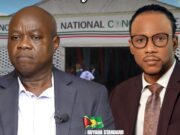Dear Editor,
Shadow Minister for Oil and Gas, David Patterson, had proposed several amendments to the Petroleum Activities Bill 2023 in the National Assembly, all of which were rejected by the government. As such, the bill was passed by the National Assembly with no further amendments. These proposals, however, have been the subject of public dialogue by several stakeholders and media entities.
Proposed Amendments
1. The Opposition MP proposed a formula ranging from a minimum of 60-40 and not higher than 70-30 percent production sharing to be included in the Petroleum Activities Bill.
Commentary
It appears that this is in relation to the cost recovery ceiling of not less than 60%-70% based on my interpretation on how it was reported in the media. It can be argued that this is an inconsequential proposal given that the new model PSA has already catered for this wherein the cost recovery ceiling is capped at 65% down from 75%. Additionally, the cost recovery ceiling forms part of the fiscal framework which is prescribed as part of the terms and conditions in the Production Sharing Agreement (PSA). The reason why it is not included in the Petroleum law itself is because it is the law that would give effect to the PSA and vice versa.
In that regard, section 12 of the Petroleum Activities bill establishes that “the Minister may enter into an agreement, not inconsistent with the Act, with a company for –
a) The grant of a license or permit pursuant to section 6;
b) The conditions to be included in a license or permit granted or renewed under this Act;
c) Any matter incidental to or connected with paragraphs (a) and (b)
Also, section 33 establishes that “where an application is made under section 32 (1) for a petroleum production license, the Minister may grant the license, on such conditions as the Minister determines are necessary to give effect to this Act”. The conditions referred thereto are those conditions established pursuant to the revised Production Sharing Agreement (PSA). In so doing, it gives the government the flexibility to change the fiscal terms and conditions, inter alia, the PSA without having to amend the legislation through the National Assembly.
2. The Opposition proposed to block operators from recouping their exploration costs by restricting comingling exploration with production costs. It goes onto to state that a strict separation shall be maintained between exploration and production activities, costs, and revenues. No revenue from production activities can be charged to exploration activities.
Commentary
This proposal ignores completely the standard accounting rules in petroleum activities. It reflects the lack of understanding of the nature of the industry as well. There are four broad categories of costs in the petroleum industry, namely, exploration, development, production, and operating costs. The exploration and development costs are the costs incurred to first discover whether there is crude oil in commercial quantities in an oil field, and the development costs are those costs incurred to prepare the field for production. The cost for the FPSOs, for instance, is part of the development costs. So, both exploration and development costs would be considered the capital expenditure (CAPEX), or the investment needed to bring an oil field into production. Bearing in mind that it takes about fifteen to twenty years to explore, discover and develop an oil field before production commences, provided that the oil field is found to be commercially viable.
With that in mind, the oil companies, like any other normal business, must recover their invested capital (exploration and development costs). In this respect, the invested capital can only be recovered from the revenue generated from the production activities wherein the crude oil is extracted and monetized. So, to propose that oil companies must not recover their exploration costs from the revenues from the production activities, is effectively to propose that oil companies must not recover a significant portion of their invested capital. Such a proposal, if made into law, would not attract any oil companies in the market, and would drive away current interests.
1. “Should the Cabinet grant the Minister approval to conduct direct negotiations, the Minister is required to seek the approval of the National Assembly before issuing the license”.
Commentary
This provision seems to cater for country-to-country collaboration as the government had already disclosed their intention to explore this in the future. To this end, one would recall that the Vice President, Dr. Bharrat Jagdeo had indicated that the government reserved a few oil blocks for government-to-government partnerships /collaboration in the future.
In my view, it is not necessary to subject the terms and conditions originating out of a direct negotiation between two governments, or any direct negotiation to parliamentary approval. Based on my understanding of the Guyana Constitution, this would be regarded a function of the Executive Branch of Government and not the Legislature/National Assembly. Therefore, it may be deemed a violation of the Constitution should the National Assembly make any law (s) that confers or transfers a function of the Executive to the National Assembly, unless the Constitution is amended accordingly pursuant to the procedures prescribed therein to so do.
3. Establishing a Petroleum Commission
Commentary
The government is on record signaling its intention to establish a Petroleum Commission to regulate the industry. There is no requirement at this stage for the Petroleum Activities bill / Act to address the Petroleum Commission, because any such Commission would require a separate piece of legislation for its establishment.
There are also some practical concerns to consider that may be the likely reasons why it has not yet been put in place. My take on this is that the government need to establish the pre-requisite framework first. This includes a new modern petroleum law, the updated PSAs, the Local Content Act, which is in place, strengthening the capacity of other agencies such as the GRA, EPA, GGMC, and the Ministry.
That said, before a Petroleum Commission is established, I believe that the above pre-requisites must be met, and more importantly, is that the government need to build the requisite technical capacity of its human resources. As it is right now, the country does not have all of the technical human resources as yet. This would take some time to develop. In the meanwhile, the Ministry is carrying out the regulatory functions with the aid of international firms and consultants. And in so doing, the government is building out capacity simultaneously through knowledge transfer, training, and development.
With that in mind, now is not the right time for the Petroleum Commission, therefore, this should be pursued in the medium term.
Other Commentary
Other proposed amendments by the opposition include training fees per well of US$1.5 million annually and that the cost recovery audits should be concluded within nine months. However, the new PSAs addressed these, wherein US$1 million is required for training annually though not per well. It is unclear what is the opposition’s justification for the “per well” model, considering that there may be dry wells. With respect to the audit, the new PSA provide for 24 months for the cost oil audit to be concluded, which is reasonable. The opposition’s proposal of nine months would be insufficient given that there needs to be adequate amount of time to cater for disputes that may arise, which may have to be arbitrated, as in the case with the current audit.
Yours respectfully,
Joel Bhagwandin













